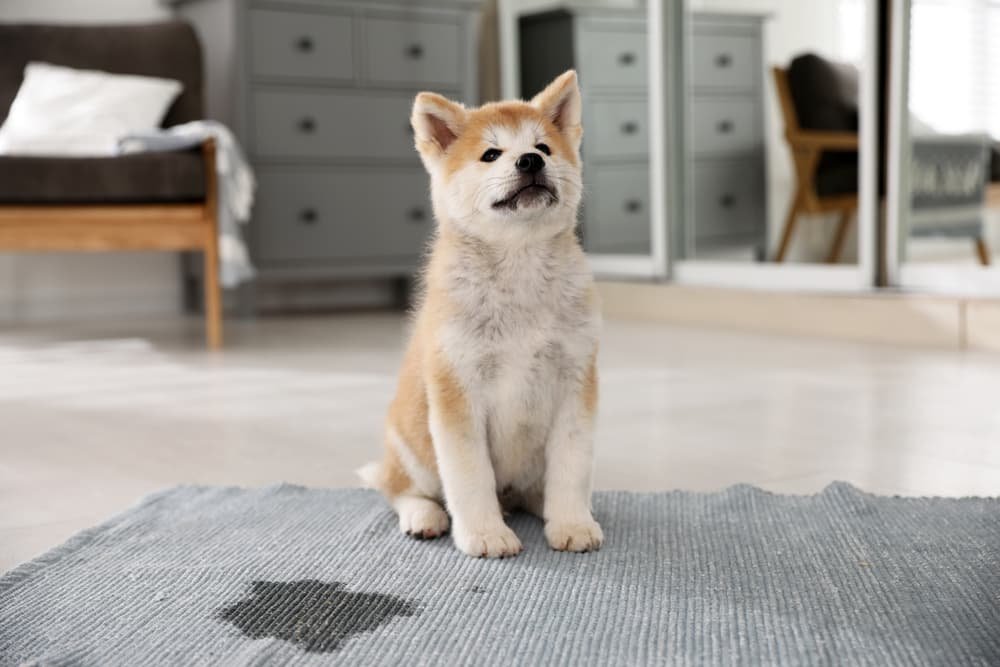When your pet pees whenever they become excited, you’re aware of just how difficult the situation may be. All you want to do is speak to them before realizing there’s an unpleasant smell of urine on the floor!
Excessive urination usually results from excitement during greetings or playing sessions, often when there are greetings involved. Although pet parents may find it an inconvenience to continue cleaning up this mess, it can be solved using both management methods and time to develop.
Are you wondering how to train your pup not to pee when excited? Check out this article for a guideline!

Why Do Dogs Pee When Excited? It may be easy to assume that every puddle around your house is caused by toilet training gone awry; however, excitement during urination could actually be contributing to any puddles you find around.
Be mindful that any dog who pees when excited is having an involuntary response. But they could still be housebroken in other circumstances.
Puppies often exhibit this behavior due to a lack of muscle control in controlling their urine output, however this usually disappears as they grow older.
Excitement Urination in Dogs Vs Submissive Urination While excitement urination and submissive peeing might appear similar, each can present unique challenges for pet owners. Both may take place under similar conditions – for instance when you arrive home – however pet owners need to pay close attention to their pet’s body language to identify which form of elimination is taking place.
An excited dog may also exhibit other behaviors to demonstrate his or her joy, including slouchy facial features, wriggled body language and wide moving tail.
Submissive dogs that urinate frequently appear nervous or uncomfortable. They could lower themselves to the floor with their tail still resting against them, or flatten their ears, lick their lips frequently or turn over onto their backs while emptying their bladders – all behaviors often seen among submissive breeds of dog. Such body language is used by submissive dogs as a form of pleasing higher-ranked people.
Are You Wondering How to Stop Dogs Peeing When Excited

Wondering how to stop an excitable pup from peeing when excited? Before trying any training methods, schedule an appointment with your vet first in order to rule out any health conditions that could contribute to an urinary tract infection (UTI) and get your “all clear”. Once that is accomplished, follow these tips in order to treat excitement peeing issues effectively.
Keep greetings simple. Although you want to greet your favorite pup upon your return, excessive greetings can cause leaks. Instead of making an announcement of your reunion using an enthusiastic, joyful voice and lavishing lots of hugs on them all at once, allow him to meet you at his own pace in an relaxed manner – without reaching out and hugging him too often!
As greetings move outdoors, no longer will you have to think about scrubbing your throw rug as you meet with guests on the grass or sidewalk. Just beware if leashing your dog for this greeting as bending over him could result in his urine spilling out when applying his leash – this may cause his bladder control to improve quickly enough for an outdoor greeting to become feasible! Until that day arrives, consider keeping family reunions inside with rolled up rugs until your canine has more control of his bladder!
Be mindful of your body and body language. Sometimes we’re unaware of the impact our body language can have on our pet’s behavior, such as reaching out and giving enthusiastic pats on his back or head – although this might seem like a great way to say hi, but it could actually trigger more anxiety for him than is manageable without accidentally spilling over into aggression. Instead, consider squatting with your dog facing away while gently patting his shoulders or sides for better results.
Reduce Volume. Similar to body language, our voice can intensify a dog’s excitement. Instead of using loud volume or volume when greetings your canine friend, make your voice soft and low when greetings them.
Redirect using sweets or toys. Giving your dog an “outlet” might help alter greetings; toy lovers might enjoy being allowed to grab stuffie toys, while treat-driven animals might take pleasure in finding treats on the floor that you threw for them to find! However, remember the difference between giving these treats calmly and providing yet another reason to pee!
Manage greetings for guests. Instead of trying to accommodate both visitors and your pet’s peeing at the front door simultaneously, consider placing your pet in an isolated area as you welcome guests into your home. Allow everyone time to settle before taking out your dog to greet guests and let everyone know the proper ways of interaction with him or her in order to avoid accidental triggers.

